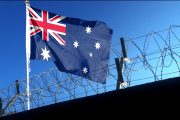Following last week’s deadly shootings at two New Zealand mosques that left 50 dead and many more seriously injured, Internet Service Providers in New Zealand have responded by implementing outright censorship of content related to the shootings. That censorship is manifested in different ways — from blocking certain content to barring access to entire alternative news sites. Major social media companies had already begun purging and censoring posts about the shootings, but the CEOs of major telecommunications firms in New Zealand and Australia have gone even further — creating what could be described as “The Great Trans-Tasman Firewall.” And the government of New Zealand is threatening citizens with harsh fines and jail time for possessing or sharing the video showing the shootings.
After the shootings were streamed live on Facebook by the shooter himself, the social media giant deleted the video and froze the account belonging to Brenton Tarrant, who is identified as the shooter. In the next 24 hours, Facebook blocked another 1.2 million attempts to upload the video and removed another roughly 300,000 uploads that managed to get through the filters.
While it may seem reasonable for Facebook to ban and block the video of the shooting, the social media platform has gone even further, censoring even some discussions of the shooting. And Scribd, a social media document-sharing website, has been busily scrubbing the site of all copies of Tarrant’s manifesto.
Perhaps worst of all, though, is Twitter. The so-called free-speech platform forced journalist Nick Monroe to delete eight tweets he posted as he covered the shootings as they were happening.
Of those eight tweets, only one included a link to the shootings. Of the other seven, one included a link to the manifesto, one included a paraphrase from the manifesto about wanting to start a civil war in America, one included a link to a “catbox” video (no, this writer does not know what that is, either) that has since been deleted, one is a quote of the shooter saying “subscribe to pewdiepie” before starting the shooting, one is a link to the shooter’s post on 8chan’s /pol/ board about his weapons, and two are links to the shooter’s Twitter account. One of the Twitter links was a tweet showing that two days before posting on 8chan about the weapons, the shooter posted the same thing to Twitter. The other Twitter link was to show that the Twitter account was a relatively new one.
Monroe used the tweet showing Tarrant posting about his weapons to display the hypocrisy of Twitter banning 8chan for having that post. Since Tarrant tweeted his weapons two days before posting the same content to 8chan, Monroe tweeted, “You can’t ban 8chan for this without banning Twitter.”
It appears, however, that while Twitter is strong in the hypocrisy column, it is conversely weak in the logic column, since under threat of banning Monroe, the social media “free-speech” platform demanded he take down the tweet. Oh, the irony.
Following the censorship practiced by Facebook, Scribd, Twitter and other social media platforms, the CEOs of three of New Zealand’s largest Internet Service Providers — Spark, Vodaphone, and 2degrees — published an open letter to Twitter, Facebook, and Google. That letter — available in both PDF and Text formats — states, “Consumers have the right to be protected, whether using services funded by money or data. Now is the time for this conversation to be had and we call on all of you to join us at the table and be part of the solution.” The letter calls for “following European proposals which include taking down material within a specified period, proactive measures and fines of up to $80m for failure to do so,” according to NZHerald.
NZHerald is not merely an innocent bystander reporting on this, by the way. As Monroe reported in tweets which somehow evaded Twitter’s censorship, NZHerald quietly edited an article about the shooting to remove a reference to a “well known Muslim local” who “chased the shooters and fired two shots at them as they sped off.” This can clearly be seen by looking at the “before” and “after” versions of the article.
NZHerald also reported that the CEOs — Spark’s Simon Moutter, Vodafone’s Jason Paris. and 2degrees’ Stewart Sherriff — wrote, “You may be aware that on the afternoon of Friday 15 March, three of New Zealand’s largest broadband providers, Vodafone NZ, Spark and 2degrees, took the unprecedented step to jointly identify and suspend access to web sites that were hosting video footage taken by the gunman related to the horrific terrorism incident in Christchurch.”
Those CEOs lamented that “it is impossible as internet service providers to prevent completely access to this material,” adding, “hopefully we have made it more difficult for this content to be viewed and shared – reducing the risk our customers may inadvertently be exposed to it and limiting the publicity the gunman was clearly seeking.”
Part of “mak[ing] it more difficult for this content to be viewed and shared” includes not only removing or blocking the video and manifesto as well as discussions of them, but blocking access to websites that are even suspected of making “this content” available.
The letter goes on to say “Internet service providers are the ambulance at the bottom of the cliff, with blunt tools involving the blocking of sites after the fact. The greatest challenge is how to prevent this sort of material being uploaded and shared on social media platforms and forums.” And the CEOs wrote that they “call on Facebook, Twitter and Google, whose platforms carry so much content, to be a part of an urgent discussion at an industry and New Zealand Government level on an enduring solution to this issue.”
That “discussion at an industry and New Zealand Government level” will almost certainly end with demands on the part of government and acquiescence on the part of Internet businesses with the end result being even greater restrictions on free speech.
New Zealand Prime Minister Jacinda Ardern told reporters this week, “It’s our view that it cannot, should not, be distributed, available, able to be viewed. It is horrendous,” adding, “While they’ve given us those assurances, ultimately the responsibility does sit with them. I want them, very much, to focus on making sure that [the video] is unable to be distributed.”
Given the close (read: symbiotic) relationship between Internet Service Providers and the government in New Zealand, this should serve as a cautionary tale for those who favor Net Neutrality and other government regulation of the Internet in the United States.
Ardern’s heavy-handed approach is not mere bluff and bluster, either. New Zealand police posted to Facebook to “remind the public that it is an offence to share an objectional publication which includes the horrific video from yesterday’s attack.” The post went on to say, “If you see this video, report it immediately. Do not download it. Do not share it. If you are found to have a copy of the video or to have shared it, you face fines & potential imprisonment.” Keeping with the 1984 theme of the post, New Zealand Police continued by asking, “What are the penalties for possession or trading in objectionable material?” and answering:
Anybody found “knowingly” in possession of objectionable material can receive a maximum of 10 years imprisonment.
Every time a person downloads objectionable material onto their screen, there is the potential for a possession offence having been committed.
Anybody who knowingly makes or knowingly trades, distributes, or displays an objectionable publication via the Internet can receive a maximum of 14 years imprisonment.
It appears that while pretending to limit “the publicity the gunman was clearly seeking,” Big Internet and Big Government in New Zealand are bending over backward to give him what he said he wanted: a fight between those who value liberty and those who would take it away. Of course, since he said that in his manifesto and Kiwis aren’t allowed to even possess (much less read) it, many of them may be unaware that they are being played as pawns in a game they are deliberately being kept from understanding.
Photo: juststock/iStock/Getty Images Plus





